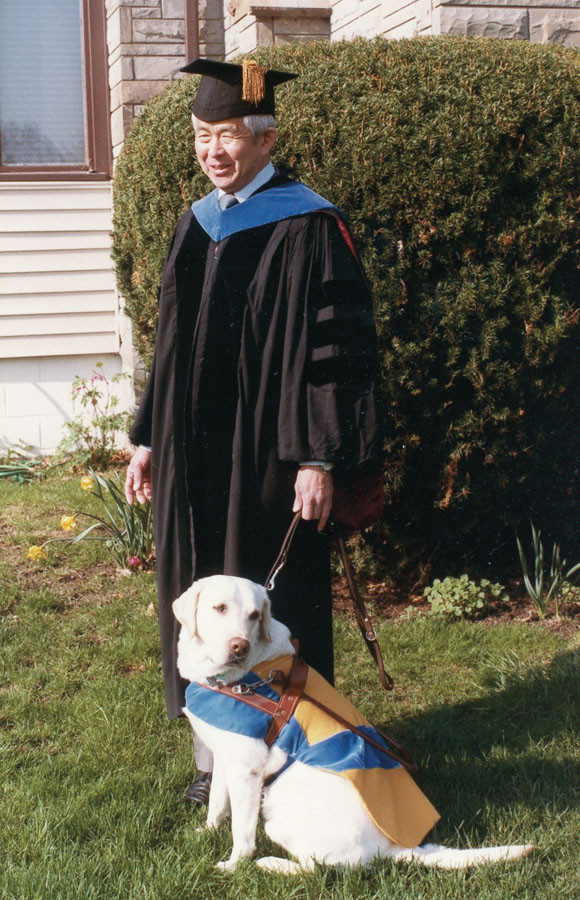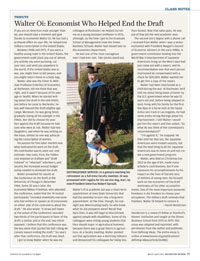Class Notes
 DISTINGUISHED SERVICE: In a gesture marking his retirement as a full-time faculty member, Oi was presented with regalia for
his service dog, Karl, by now President Emeritus Robert Sproull. (Photo: Courtesy of Eleanor Oi ’13S (MBA))
DISTINGUISHED SERVICE: In a gesture marking his retirement as a full-time faculty member, Oi was presented with regalia for
his service dog, Karl, by now President Emeritus Robert Sproull. (Photo: Courtesy of Eleanor Oi ’13S (MBA))If you are an American male younger than 66, you should take a moment and give thanks to economist Walter Oi. He has had a profound effect on your life. He helped end military conscription in the United States.
Between 1948 and 1973, if you were a healthy young male in the United States, the government could pluck you out of almost any activity you were pursuing, cut your hair, and send you anywhere in the world. If the United States was at war, you might have to kill people, and you might return home in a body bag.
Walter, who was the Elmer B. Milliman Professor Emeritus of Economics at Rochester, did not think that was right, and it wasn’t because of his own age or health. When he started writing about the draft in the mid-1960s, just before he came to Rochester, he was well beyond the draft-eligible age range. Moreover, he was going blind, gradually losing all his eyesight in the 1960s. Nor did he choose his position against the draft because he had sons who were at risk. Walter had two daughters, and when he was writing on the issue, almost no one was advocating the conscription of women.
His passion for free labor markets was what motivated his work on the draft. His contribution was to point out—and estimate—two costs. First, the hidden cost imposed on draftees and “draft-induced” or “reluctant” volunteers, and second, the increased annual budget outlay needed to eliminate the draft.
Walter presented his results at the Conference on the Draft at the University of Chicago in December 1966. Some 30 years later, the economist Milton Friedman, who attended the conference, noted that the 74 invited participants “included essentially everyone who had written or spoken at all extensively on either side of the controversy about the draft.” He also wrote: “A straw poll taken at the outset of the conference recorded two-thirds of the participants in favor of the draft; a similar poll at the end, two-thirds opposed. I believe that this conference was the key event that started the ball rolling decisively toward ending the draft.” Six years after that conference, the draft was dead.
I got to know Walter when he was my colleague at Rochester. He helped recruit me as a young assistant professor in 1975, although, by the time I got to the Graduate School of Management (now the Simon Business School), Walter had moved over to the economics department.
He was one of the most courageous men I had ever met. Two stories stand out. Walter’s first academic job was a short-term appointment at Iowa State University that had the potential to turn into a long-term appointment. At the time, though, his eyesight was deteriorating badly. So who knew what his job prospects were? Recall that back then, it was still legal to discriminate against people with disabilities. Some of his colleagues were telling young students that they should major in agricultural business because there was a great future in agriculture. At a faculty meeting, Walter pointed out that agriculture was a declining industry and denounced his colleagues for being less than honest. Now that takes guts. He was out of that job the next academic year.
The second story begins with a phone call I received from Walter when I was a senior economist with President Reagan’s Council of Economic Advisers in the early 1980s. A government commission looking into the World War II imprisonment of Japanese Americans living on the West Coast had just come out with a report, and its recommendation was that each person imprisoned be compensated with a check for $20,000. Walter wanted me to get him a copy of the report.
Walter had been imprisoned as a child during the war. At Rochester, he’d told me about being taken prisoner by the U.S. government when he was 13 years old and, before being shipped inland, living with his family for the first few days in a horse stall at the Santa Anita race track in Los Angeles. He had some pretty strong feelings about his imprisonment. I told Walter I would get him the report and then asked, “So what do you think of the commission’s recommendation?”
“I’m against it,” he snapped. He then told me that yes, the Japanese Americans were treated unjustly, but that the best thing to do for Japanese Americans was to move on and not create a new government program.
Walter, who died on Christmas Eve 2013 at the age of 84, made many scholarly contributions. But if one measures his accomplishments by his impact on the lives of literally tens of millions of young men, his focused work on the economics of the draft dominates all his other accomplishments. One of the most important economic freedoms is the freedom to choose your occupation. The military draft removes that freedom. Walter Oi helped to restore it.
—David Henderson
Henderson is a research fellow at Stanford’s Hoover Institution and taught at the Simon Business School from 1975 to 1979. This essay was adapted and reprinted, with permission from the author and publisher, from Defining Ideas. The entire essay is online at www.hoover.org/publications/defining-ideas/article/164881.

